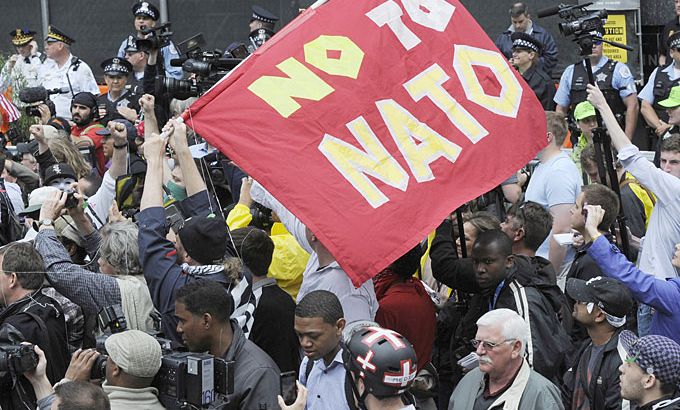
Can NATO survive?
As leaders seek to exit the draining war in Afghanistan, we ask if the defence alliance is sliding into irrelevance.
The North Atlantic Treaty Organisation (NATO) has announced that its troops will shift to a support role in Afghanistan by 2013, with local forces taking the lead role.
|
“[NATO] was a bedrock against the Warsaw Pact for 40 years. I totally disagree with what [NATO leaders] have agreed to [in Chicago] …. We just keep pushing for war, war, war…. We should be talking about resolving things.” – Ann Wright, a retired US army colonel |
The announcement came following a two-day summit in Chicago, in which leaders sought an exit strategy from the unpopular and draining war in Afghanistan, where the Taliban remains a powerful force 11 years after the US-led invasion.
Nearly seven out of 10 Americans now believe the US should get out of Afghanistan and European allies have also been expressing war fatigue. Francois Hollande, the new French president, says his country’s troops will be withdrawn by the end of the year.
Thousands protested outside the summit, calling for NATO’s dissolution amid economic anxiety and rising anti-war sentiment.
But during his closing statement at the summit on Monday, Barack Obama, the US president, emphasised what he described as the alliance’s greatest accomplishments, saying: “NATO has been the bedrock of common security, freedom and prosperity for nearly 65 years. It hasn’t just endured; it has thrived because our nations are stronger when we stand together.”
|
“NATO has done a lot of good things, but it’s not doing very well [now]. In Afghanistan we’re pulling out not because we’re winning but because we’re tired, and we’re going to see the Taliban coming back and it’s going to be a catastrophe for the people there.” – Kurt Volker, the former US ambassador to NATO |
NATO was founded more than 60 years ago to counter the Soviet bloc. But the alliance’s mutual defence clause had never been used until the September 11 attacks. The war in Afghanistan has been the only instance in which NATO has done so.
Last year, NATO forces intervened in Libya under a UN mandate to protect the people. But some countries later accused it of going far beyond that mandate by actively assisting in the toppling of Muammar Gaddafi.
NATO also has its internal woes. European governments are slashing defence budgets to cope with economic turmoil. And with the US already paying a disproportionate part of NATO’s budget, there is concern in Washington over shouldering this financial burden.
So can, and should, the NATO alliance survive?
Joining presenter Anand Naidoo on Inside Story Americas to discuss this are guests: Ann Wright, a retired US army colonel and one of the leaders of the anti-NATO protests; Kurt Volker, the former US ambassador to NATO; and Heather Conley, the director of the Europe Program at the Center for Strategic and International Studies.
|
“We have to really examine NATO’s list of emerging challenges and threats [which are] growing while its budget is shrinking …. It is again at the crossroads, it will have to decide what it wants to do.” Heather Conley, the director of the Europe Program at the Center for Strategic and International Studies |
ABOUT NATO:
- The treaty was signed on April 4, 1949.
- NATO was initially conceived as a defence against Soviet expansion.
- It has 28 member states in North America and Europe.
- Its first intervention was in the Balkans in the 1990s.
- It invoked the mutual defence clause in Article 5 of the treaty for the first time to invade Afghanistan after the 9/11 attacks in the US.
- About 130,000 international troops operating in Afghanistan are under NATO command.